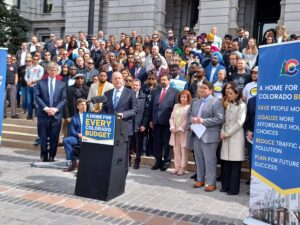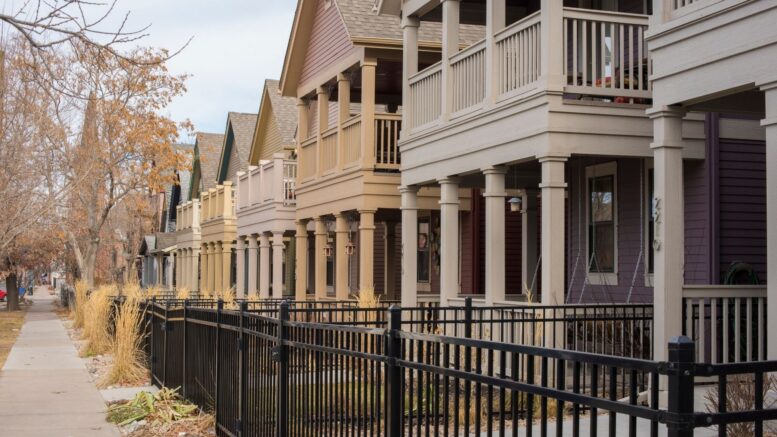Gov. Jared Polis kick-started the 2024 legislative discussion on affordable housing Monday by issuing an executive order that syncs a wide range of state grants with the administration’s housing policy and directs the Department of Housing to speed its process for awarding funds.
Coming roughly 3-1/2 months after the Democratic governor’s land-use reform proposal died on the final day of the 2023 legislative session amid a brawl between the state and municipal leaders, the order steers clear of such intergovernmental feuding by affecting only state actions. But in several places, Polis’ action also makes it clear that he expects this only to be a first step in this area, saying that the order “is not the only solution” and that increased housing availability and affordability “will depend on improved collaboration.”
Polis’ order first lays out his strategic growth goals for the state, including the incentivization of housing for every budget range, support of economic development in commercial and infill areas and the linking of housing growth to sustainable transportation to reduce emissions. Then it directs action that can be divided into two parts.
Two big impacts from the order
First, the executive order mandates that agencies including the Department of Transportation, Department of Local Affairs and Office of Economic Development and International Trade inventory all policies and grant programs that support local government by Dec. 15. Such inventories must detail programs that support housing, transportation, economic development, water infrastructure and other growth-related functions and ensure that they support the listed strategic growth goals.
Second, the order directors that the Division of Housing within DOLA execute grant and loan contracts within 120 days by Jan. 1 and within 90 days by July 1, produce contracts within 30 days after funds are awarded and get signed contracts to recipients within another 10 days. Then it directs the housing division to use existing state and federal funds to provide deeper subsidies to maximize unit production and to evaluate ways to provide more funding opportunities, including pre-development funding and “first-in” catalytic funding commitments.
“Working hand in hand with communities and the Legislature, we can support a Colorado that is livable, sustainable and affordable,” Polis wrote in the executive order. “Neither the state nor local governments should be a barrier to housing development, and state programs must support and align with the state’s strategic growth goals.”
A reset after legislative failure

Gov. Jared Polis rolls out his affordable-housing bills at a news conference at the Capitol on March 22.
The effort is much less comprehensive than Senate Bill 213, the wide-ranging land-use bill that Polis unveiled in mid-session earlier this year. That proposal sought to allow landowners to put up housing ranging from duplexes to six-plexes in areas zoned for single-family housing, remove local barriers to multifamily housing along high-traffic corridors, require local housing needs assessments and bar local restrictions against manufactured or modular housing.
But the executive order also is much less confrontational that the bill that sought to override local control and spawned massive backlash from cities across the political spectrum, leading it to die on the Senate calendar when ruling Democrats couldn’t find a compromise between that aggressive approach and a study-first approach backed by the Senate. Leaders within the Polis administration have begun speaking with proponents and opponents of that failed bill about a possible route forward for at least some of its provisions this year, but Colorado Municipal League officials have said that member cities are not interested in giving up home-rule powers.
Polis’ order once again lays out his case for why officials must attack the issue with urgency. Colorado has become the eighth-most-unaffordable state in the U.S. as nearly a third of households spend more than 30% of their income and housing, and the expected addition of 1.72 million people by 2050 will exacerbate that situation without construction of more affordable units, it states.
The order generated support from a diverse group of environmentalists, affordable-housing advocates, elected county government leaders, state and federal agencies and business groups, according to a release from the governor’s office.
Diverse interests support affordable housing
Colorado Chamber of Commerce President/CEO Loren Furman noted that data her organization has collected has shown that the state’s high cost of housing is hurting its ability to compete for new jobs and to retain existing jobs. The state needs to use all the tools it has to reduce the housing shortage, and Polis’ directive to his agencies to assess current funding programs is a way it can impact both that shortage and affordability.
“This type of collaboration across state agencies and with defined processes will help us reduce the costs and remove the growing barriers to development and growth,” added Tyrone Adams, CEO of the Colorado Association of Realtors. “We literally can build our way into an environment that delivers much-needed housing, protects our communities and embraces the diversity, equity and inclusion of all Coloradans.”
Brian Rossbert, executive director of nonprofit Housing Colorado, said he is hopeful that the alignment of state resources will result in more funding and quicker contract turnarounds for affordable housing.
And Elise Jones, executive director of the Southwest Energy Efficiency Project, said that by aligning state transportation and water-conservation policies with housing policies, it could lead to shorter commutes, fewer emissions and less sprawl, among other outcomes.
